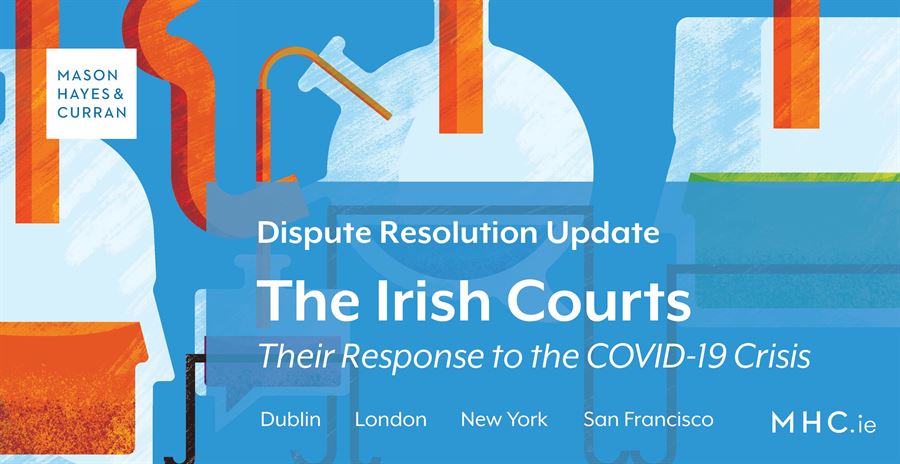
In light of the COVID-19 pandemic and the importance of minimising the exposure of persons using the courts to unnecessary risk, the Courts Service of Ireland and the judiciary have made a number of announcements with regard to how court business should be conducted. We outline the measures implemented by the Courts to date and discuss the judiciary’s plans to facilitate future hearings remotely.
Commencement of cases
It was announced on 16 March that no new cases or trials were to commence in the High Court for the remainder of the legal term, even in trials not requiring oral testimony.
New proceedings may still be initiated and documents can be issued and filed as court offices remain open. However, attendance at court offices will now be by prior appointment. Where stamp duty is payable on proceedings issued whilst the stamp office is closed, an undertaking in writing to pay such amounts signed by the solicitor will be accepted.
In circumstances where court offices remain open, proceedings can be issued and no Statute of Limitations issues arise. Even if the offices were to close, plaintiffs can take comfort in the fact that the rules of court provide that if the statutory time limit expires on a day the office is closed, that limitation period is taken to expire on the next day the office is open and it is possible to file proceedings.
Urgent applications
Judges have remained available to hear urgent matters. Urgent matters in the High Court have been defined as: habeas corpus; extradition; applications for bail; injunctions and their enforcement; wardship matters; and urgent judicial review. In the Circuit Court, urgent applications have not been defined and matters considered urgent should be submitted to the relevant Circuit Court Office. The District Court has defined urgent matters as consisting of certain criminal, family and child care matters. All civil matters in the District Court are considered non-urgent however the Court may consider a civil matter urgent if a good case can be made.
Ongoing proceedings
Any non-urgent matters listed in the High Court or the Commercial Court have been adjourned generally with liberty to re-enter. In addition, all motions and applications listed for hearing before the Master of the High Court have been adjourned generally with liberty to enter. In the Circuit Court, civil lists have been adjourned to a date after 20 April 2020, save for urgent applications. Any appeals listed for hearing in the Court of Appeal or the Supreme Court have been adjourned to a date next term or when the situation sufficiently improves, with the exception of appeals of “particular urgency”.
During the Covid-19 crisis consent orders are to be dealt with without the necessity of the parties attending court. Such orders are being made on foot of an email exhibiting the consent of all parties to the litigation. These orders will date from the date when the email containing the consent is received.
The most recent statement of the judiciary confirmed that all necessary case progression, insofar as it can be conducted remotely, is continuing.
Judgments
The Courts Service has confirmed that all written judgments will be delivered by way of email to the parties concerned and the judgment will subsequently be posted on the Courts Service website. The date and time of delivery to the parties will be posted in the legal diary as normal. If there are any issues following the delivery of the judgment such as the precise form of order or questions concerning costs, the relevant Court should be notified by email. If the parties cannot come to an agreement on these issues written submissions are to be filed electronically within 14 days of delivery of the judgment (subject to any other direction given in the judgment). Oral hearings to resolve such matters will only be permitted where the interests of justice so requires.
Plans for the future and remote court hearings
The Chief Justice and the Presidents have confirmed that ICT infrastructure has been put in place to facilitate remote court hearings and an initial system trial is imminent. If this is successful, it will be expanded to ensure that the system works satisfactorily prior to it being deployed to conduct actual hearings. It is hoped that a pilot facility for remote hearings in suitable cases could be rolled out close to the beginning of the new legal term on 20 April 2020.
The Chief Justice and Presidents have confirmed that where trials are proceeding during the Covid-19 emergency, the obligation to administer justice in public is satisfied by allowing only bona fide members of the press to be present in court. As a result, the open justice principle could be satisfied in remote hearings by giving the press access in some way. In the UK the open justice principle has been satisfied by streaming hearings over platforms such as youtube or uploading publically accessible transcripts of court proceedings.
Conclusion
As things stand almost all matters, outside of urgent applications, that were listed up to 3 April have been adjourned. The situation is fluid and there will be more announcements on court arrangements in the coming weeks. As regards remote hearings we can expect guidance from each President in due course as to how the measures will apply in the relevant court.
For more information, contact a member of our Dispute Resolution team.
This article was contributed by Louise Mitchell and Ciara Browne, Associates.
The content of this article is provided for information purposes only and does not constitute legal or other advice.






